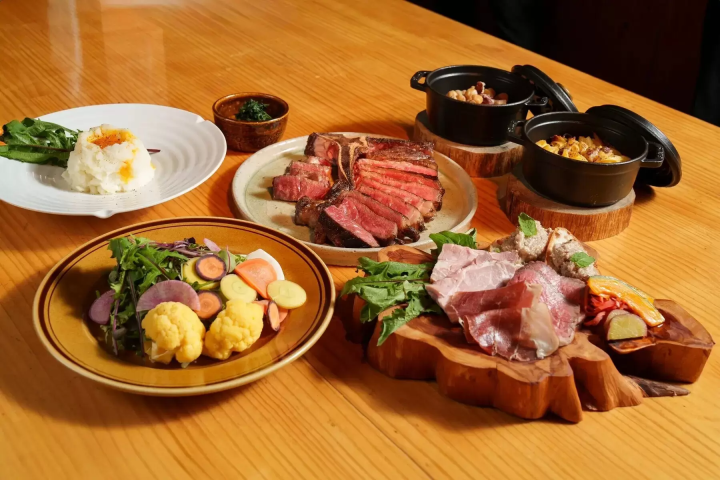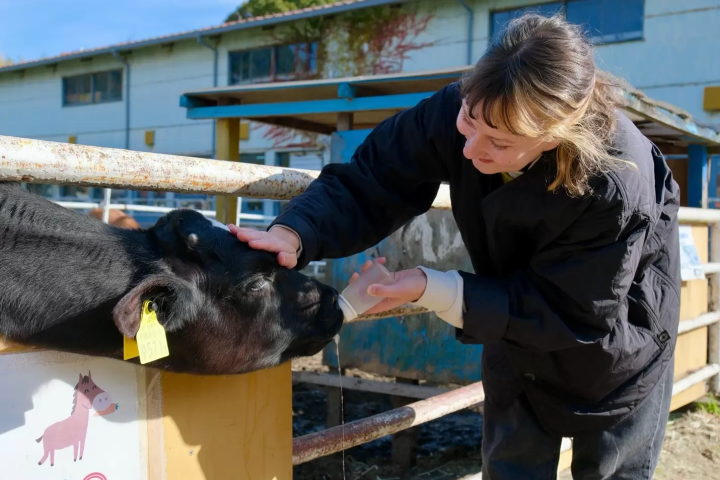Perfect Vegan Snacks! Age-Kakimochi From Tokyo's Sugito Senbei

At Sugito Senbei in Katsushika, Tokyo, you can pick up age-kakimochi, a delicious vegan snack. We'll take a look at how it's made, and what makes it so special.
About Sugito Senbei and its Nine Decades of History
The Keisei Railway is a heavily trafficked public transport line that runs from Narita Airport to the heart of Tokyo, and Sugito Senbei is located near Keisei’s busy Aoto Station at a location just a five minute walk through the bustling shopping street right in front of the station, so it’s almost impossible to get lost.
![[Tokyo] Sugito Senbei Age-Kakemochi: Perfect Vegan Snacks!](https://resources.matcha-jp.com/resize/720x2000/2017/02/27-19959.webp)
Sugito Senbei got its name from Sugito Town in Saitama, the hometown of the previous owner. The shop is approaching the 90th anniversary of its founding, but it was originally situated at Yotsugi, 2 stops away from Aoto.
However, the shop relocated to its Aoto location during the Second World War to escape the wartime destruction, and ended up putting down roots there. Sugito Senbei is beloved not just by local residents, but by senbei fans all over Japan.
The Process Behind Making Age-Kakimochi!
Sugito Senbei has a production facility in the back, where their experts are carefully making age-kakimochi.
![[Tokyo] Sugito Senbei Age-Kakemochi: Perfect Vegan Snacks!](https://resources.matcha-jp.com/resize/720x2000/2017/02/27-19968.webp)
Kakimochi are thick senbei crackers. Age-kakimochi, on the other hand, are kakimochi made from glutinous rice, which are then deep fried in oil instead of being baked. Sugito Senbei uses extremely hot oil for frying, which dissipates the moisture and gives the agemochi a characteristically crisp crunch when chewed. There are many fans of this texture in Japan.
Step 1: Steaming the Glutinous Rice
![[Tokyo] Sugito Senbei Age-Kakemochi: Perfect Vegan Snacks!](https://resources.matcha-jp.com/resize/720x2000/2017/02/27-19969.webp)
Sugito Senbei steams the rice instead of boiling it, which enhances its flavor and sweetness. On the day we went, the workers had been right in the middle of doing the steaming.
Step 2: Making the Mochi, Then Slice It Up and Dry The Pieces
![[Tokyo] Sugito Senbei Age-Kakemochi: Perfect Vegan Snacks!](https://resources.matcha-jp.com/resize/720x2000/2017/02/27-19962.webp)
After steaming the glutinous rice, they render it into mochi, slice it up and place it on racks to dry. At most, this process takes up to three weeks. Because the drying process is affected by the season and the weather, apparently only a craftsman can tell when the process is finished.
Step 3: Frying the Dried Mochi in Vegetable Oil
![[Tokyo] Sugito Senbei Age-Kakemochi: Perfect Vegan Snacks!](https://resources.matcha-jp.com/resize/720x2000/2017/02/27-19960.webp)
Once the mochi have been dried sufficiently, the next step is frying them in very hot oil. Figuring out exactly when they’re done is another time when you have to rely on the intuition of the craftsmen.
Step 4: Season the Freshly Fried Kakimochi with Soy Sauce
![[Tokyo] Sugito Senbei Age-Kakemochi: Perfect Vegan Snacks!](https://resources.matcha-jp.com/resize/720x2000/2017/02/27-19963.webp)
The workers quickly season the mochi with soy sauce as they come out of the fryer, which give off sizzling sounds. By seasoning them when they’re hot enough to sizzle, the flavor sinks in and makes the kakimochi even more delicious.
Soy sauce is the only seasoning used for the soy sauce-flavored age-kakimochi. While recent senbei variants are flavored with dashi soy sauce, containing fish stock, Sugito Senbei only uses soy sauce. Since the age-kakimochi only only contains rice, vegetable oil and soy sauce, it’s suitable for vegans.
Step 5: Allow The Age-Kakimochi to Cool Before Bagging Them, And They’re Done
![[Tokyo] Sugito Senbei Age-Kakemochi: Perfect Vegan Snacks!](https://resources.matcha-jp.com/resize/720x2000/2017/02/27-19961.webp)
The workers use electric fans to dissipate the heat and cool off the age-kakimochi. Once they’ve cooled and the workers stuff them into bags, they are finished. While unfortunately, you cannot normally take a tour of the production facility, you can take a peek at what’s happening from the shop.
Good News for People Who Want to Eat Fresh Age-Kakimochi! They’re 40 Yen Apiece
![[Tokyo] Sugito Senbei Age-Kakemochi: Perfect Vegan Snacks!](https://resources.matcha-jp.com/resize/720x2000/2017/02/27-19965.webp)
Since Sugito Senbei makes their age-kakimochi in a facility connected to the shop, there must be people who think, ”I want to try some piping-hot senbei!” On weekday mornings only, you can buy freshly fried senbei for 40 yen apiece.
While the staff doesn’t speak English, if you tell them “agetate” and point, they’ll be able to help you out.
Samples to Brighten Up Your Morning! Just Don’t Eat the Pieces Laid Out Around the Shop!
![[Tokyo] Sugito Senbei Age-Kakemochi: Perfect Vegan Snacks!](https://resources.matcha-jp.com/resize/720x2000/2017/02/27-19967.webp)
The age-kakimochi laid out like this might look like samples, but actually they’ve just been left to cool. When the interior of the production facility is already full, the age-kakimochi are left to cool inside the store. Don’t snack on them.
If you want some samples, you can get them in the morning
The Store’s Top Recommendation! Salt Flavored Age-Kakimochi
![[Tokyo] Sugito Senbei Age-Kakemochi: Perfect Vegan Snacks!](https://resources.matcha-jp.com/resize/720x2000/2017/03/07-20689.webp)
Sugito Senbei’s most popular product may be the soy sauce-flavored age-kakimochi, but the owner, Mr. Orihara, says that he recommends the salt-flavored age-kakimochi to international visitors. Of course, these only contain rice, vegetable oil and salt. Crunchy and light, these definitely feel like potato chips. Even if you don’t like soy sauce flavoring, you’re sure to like the salt variety! One bag is 400 yen.
The Ranks of Age-Kakimochi Fans Are Swelling! Pick Some Up as a Souvenir!
![[Tokyo] Sugito Senbei Age-Kakemochi: Perfect Vegan Snacks!](https://resources.matcha-jp.com/resize/720x2000/2017/03/03-20357.webp)
The atmosphere of this low-lying Tokyo area shop is enjoyable in and of itself. Have a bite of freshly fried age-kakimochi and stroll around, then pick some up as souvenirs. Keisei Aoto Station is one limited express train from Narita Airport, so you can drop in before you head back home. Once you start, you may get addicted to the taste, so perhaps you should buy in bulk, as the locals do.
Webライター。東京都葛飾区在住。実家の最寄り駅である京都駅近辺や、葛飾区の魅力ある場所を見つけてご紹介したいと思います。現在の趣味はゲームアプリで世界中の人とUNOをすること!











































![[Company Visit List] Learn from Japanese Business Leaders: Factory Tours & Corporate Visits in Southern Osaka Featuring Manufacturing Technology and Management Philosophy](https://resources.matcha-jp.com/resize/720x2000/2024/12/13-215168.webp)
![[Recommended accommodation in Ureshino Onsen] 1.5 hours from Hakata Station! Enjoy Japanese tea and skin-beautifying hot springs at Saga Ureshino Onsen URESHINO YADOYA](https://resources.matcha-jp.com/resize/720x2000/2025/06/14-236549.webp)
